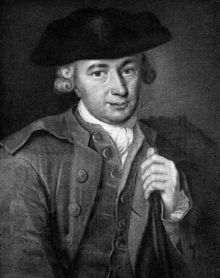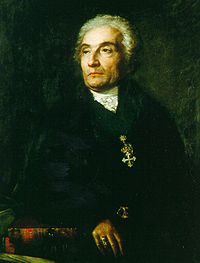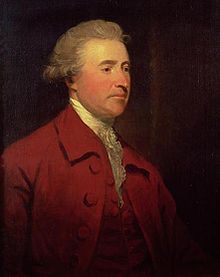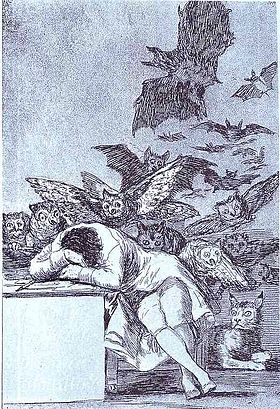- Counter-Enlightenment
-
"Counter-Enlightenment" is a term used to refer to a movement that arose in the late-18th and early-19th centuries in opposition to the 18th century Enlightenment. The term is usually associated with Isaiah Berlin, who is often credited with coining it, perhaps taking up a passing remark of the German philosopher Friedrich Nietzsche, who used the term Gegenaufklärung at the end of the 19th century. It has not been widely used since. The first known use of the term 'counter-enlightenment' in English was in 1949. Berlin published widely about the Enlightenment and its enemies and did much to popularise the concept of a Counter-Enlightenment movement that he characterised as relativist, anti-rationalist, vitalist and organic,[1] and which he associated most closely with German Romanticism. Some recent scholarship has challenged this view for focusing too narrowly on Germany and stopping abruptly in the early 19th century, thereby ignoring the Enlightenment's many subsequent critics, particularly in the 20th century. Some scholars reject the use of the term 'the Counter-Enlightenment' on the grounds that there was no single Enlightenment for its alleged enemies to oppose.
Contents
The Counter-Enlightenment Movement vs Enlightenment Thinkers
Although the term 'the Counter-Enlightenment' was first used in English (in passing) by William Barrett in a 1949 article ("Art, Aristocracy and Reason") in Partisan Review, it was Isaiah Berlin who established its place in the history of ideas. He used the term to refer to a movement that arose primarily in late 18th and early 19th century Germany against the rationalism, universalism and empiricism commonly associated with the Enlightenment. Berlin's widely read essay "The Counter-Enlightenment" was first published in 1973, and later reprinted in a popular collection of his essays (Against the Current) in 1981. The term has only had wide currency since then.
 Isaiah Berlin traces the Counter-Enlightenment back to J. G. Hamann.
Isaiah Berlin traces the Counter-Enlightenment back to J. G. Hamann.
Berlin argues that, while there were enemies of the Enlightenment outside of Germany (e.g. Joseph de Maistre) and before the 1770s (e.g. Giambattista Vico), Counter-Enlightenment thought did not really 'take off' until the Germans 'rebelled against the dead hand of France in the realms of culture, art and philosophy, and avenged themselves by launching the great counter-attack against the Enlightenment.' This reaction was led by the Konigsberg philosopher J. G. Hamann, 'the most passionate, consistent, extreme and implacable enemy of the Enlightenment', according to Berlin. This German reaction to the imperialistic universalism of the French Enlightenment and Revolution, which had been forced on them first by the Francophile Frederick II of Prussia, then by the armies of Revolutionary France, and finally by Napoleon, was crucial to the epochal shift of consciousness that occurred in Europe at this time, leading eventually to Romanticism. According to Berlin, the surprising and unintended consequence of this revolt against the Enlightenment has been pluralism, which owes more to the Enlightenment's enemies than it does to its proponents, most of whom were monists whose political, intellectual and ideological offspring have often been terror and totalitarianism. Richard Wolin (The Seduction of Unreason 2004) has traced the modern descendants of the Counter-Enlightenment in postmodernism’s deep suspicion of “universalism,” paralleled by its endorsement of “identity politics,” and concludes that it has worked against the values of toleration and mutual recognition, not merely of diversity but of commonality.
In his book "Enemies of the Enlightenment" (2001), historian Darrin McMahon extends the Counter-Enlightenment both back to pre-Revolutionary France and down to the level of 'Grub Street,' thereby marking a major advance on Berlin's intellectual and Germanocentric view. McMahon focuses on the early enemies of the Enlightenment in France, unearthing a long-forgotten 'Grub Street' literature in the late-18th and early 19th centuries aimed at the philosophes. He delves into the obscure and at times unseemly world of the 'low Counter-Enlightenment' that attacked the encyclopedistes and fought an often dirty battle to prevent the dissemination of Enlightenment ideas in the second half of the century. A great many of these early opponents of the Enlightenment attacked it for undermining religion and the social and political order. This later became a major theme of conservative criticism of the Enlightenment after the French Revolution appeared to vindicate the warnings of the anti-philosophes in the decades prior to 1789.
In his 1996 article for The American Political Science Review (Vol. 90, No. 2), Arthur M. Melzer identifies the origin of the Counter-Enlightenment in the religious writings of Jean-Jacques Rousseau, showing Rousseau as the man who fired the first major shot in the war between the Enlightenment and its enemies. Graeme Garrard follows Melzer in his "Rousseau's Counter-Enlightenment" (2003). This contradicts Berlin's depiction of Rousseau as a philosophe (albeit an erratic one) who shared the basic beliefs of his Enlightenment contemporaries. Also, like McMahon, it traces the beginning of Counter-Enlightenment thought back to France and prior to the German 'Sturm und Drang' movement of the 1770s. Garrard's book "Counter-Enlightenments" (2006) broadens the term even further, arguing against Berlin that there was no single 'movement' called 'The Counter-Enlightenment'. Rather, there have been many Counter-Enlightenments, from the middle of the 18th century through to 20th century Enlightenment critics among critical theorists, postmodernists and feminists. The Enlightenment has enemies on all points of the ideological compass, from the far left to the far right, and all points in between. Each of the Enlightenment's enemies depicted it as they saw it or wanted others to see it, resulting in a vast range of portraits, many of which are not only different but incompatible.
This argument has been taken a step further by some, like intellectual historian James Schmidt, who question the idea of 'the Enlightenment' and therefore of the existence of a movement opposing it. As our conception of 'the Enlightenment' has become more complex and difficult to maintain, so too has the idea of 'the Counter-Enlightenment'. Advances in Enlightenment scholarship in the last quarter century have challenged the stereotypical view of the 18th century as an 'Age of Reason', leading Schmidt to speculate on whether 'the Enlightenment' might not actually be a creation of its enemies, rather than the other way round. The fact that the term 'the Enlightenment' was first used in English to refer to a historical period in 1894 (see Schmidt 2003) lends some support to this argument that it was a later construction projected back on to the 18th century.
Counter-Enlightenment and Counter-Revolution
Conservative political thinker Edmund Burke opposed the French Revolution in his Reflections on the Revolution in France
Although serious doubts were raised about the Enlightenment prior to the 1790s (e.g. in the works of Jean-Jacques Rousseau in France and J. G. Hamann in Germany in particular), the Reign of Terror during the French revolution fueled a major reaction against the Enlightenment, which many writers blamed for undermining traditional beliefs that sustained the ancien regime, thereby fomenting revolution. Counter-Revolutionary conservatives like Edmund Burke, Joseph de Maistre and Augustin Barruel all asserted a close link between the Enlightenment and the Revolution, as did many of the revolutionary leaders themselves, so that the Enlightenment became increasingly discredited as the Revolution became increasingly bloody. That is why the French Revolution and its aftermath was also a major phase in the development of Counter-Enlightenment thought. For example, while Edmund Burke's "Reflections on the Revolution in France" (1790) contains no systematic account of the connection between the Enlightenment and the Revolution, it is heavily spiced with hostile references to the French Revolutionaries as merely politicised philosophes. Barruel argues in his best-selling Memoirs Illustrating the History of Jacobinism (1797)—one of the most widely read books of its period—that the Revolution was the consequence of a conspiracy of philosophes and freemasons. In "Considerations on France" (1797), Maistre interprets the Revolution as divine punishment for the sins of the Enlightenment.
The Romantic Revolt Against the Eighteenth Century
Many, but by no means all, early Romantic writers like Chateaubriand, 'Novalis' (Georg Philipp 'Friedrich Freiherr von Hardenberg') and Samuel Taylor Coleridge inherited this Counter-Revolutionary antipathy towards the philosophes. All three directly blamed the philosophes (in France) and Aufklärer (in Germany) for devaluing beauty, spirit and history in favour of a view of man as a soulless machine and the universe as a meaningless, disenchanted void lacking richness and beauty. Of particular concern to early Romantic writers was the allegedly anti-religious nature of the Enlightenment, even though very few of the philosophes and Aufklarer were actually atheists. (Most were deists.) This view of the Enlightenment as an age hostile to religion is common ground between these Romantic writers and many of their conservative, Counter-Revolutionary predecessors. However, Chateaubriand, 'Novalis' and Coleridge are exceptions here; few Romantic writers had much to say for or against the Enlightenment. (The term itself didn't even exist at the time.) For the most part, they ignored it.
Francisco de Goya, "The Sleep of Reason Produces Monsters" (1799)
The philosopher Jacques Barzun argues that Romanticism had its roots in the Enlightenment. It was not anti-rational, but balanced rationality against the competing claims of intuition and the sense of justice. This view is expressed in Goya's "Sleep of Reason" (left), in which one of the nightmarish owls offers the dozing social critic of Los Caprichos a piece of drawing chalk: even the rational critic is inspired by irrational dream-content, under the gaze of the sharp-eyed lynx [1]. Marshall Brown makes much the same argument as Barzun in 'Romanticism and Enlightenment', questioning the stark opposition between these two periods.
By the middle of the 19th century, the memory of the French Revolution was fading and Romanticism had more or less run its course. In this optimistic age of science and industry, there were few critics of the Enlightenment, and few explicit defenders. The German philosopher Friedrich Nietzsche is a notable (and highly influential) exception. After an initial defence of the Enlightenment during his so-called 'middle period' (late-1870s to early 1880s), Nietzsche turned vehemently against it and subscribed to the earlier view of conservative Counter-Revolutionaries like Burke and Maistre, who blamed the French Revolution (which Nietzsche always hated) on the Enlightenment.
Enlightened Totalitarianism
It was not until after World War II that 'the Enlightenment' re-emerged as a key organising concept in social and political thought and the history of ideas. Shadowing it has been a resurgent Counter-Enlightenment literature blaming the 18th century faith in reason for 20th century totalitarianism. The locus classicus of this view is Max Horkheimer and Theodor Adorno's "Dialectic of Enlightenment" (1947), which traces the degeneration of the general concept of enlightenment from ancient Greece (epitomised by the cunning 'bourgeois' hero Odysseus) to 20th century fascism. (They say little about soviet communism, referring to it as a regressive totalitarianism that "clung all too desperately to the heritage of bourgeois philosophy"[2]).
While this influential book takes 'enlightenment' as its target, this includes its 18th century form – which we now call 'the Enlightenment' – epitomised by the Marquis de Sade. Many postmodern writers and some feminists (e.g. Jane Flax) have made similar arguments, likewise seeing the Enlightenment conception of reason as totalitarian, and as not having been enlightened enough since, for Adorno and Horkheimer, though it banishes myth it falls back into a further myth, that of individualism and formal (or mythic) equality under instrumental reason.
Michel Foucault, for example, argued that attitudes towards the "insane" during the late-18th and early 19th centuries show that supposedly enlightened notions of humane treatment were not universally adhered to, but instead, that the Age of Reason had to construct an image of "Unreason" against which to take an opposing stand. Berlin himself, although no postmodernist, argues that the Enlightenment's legacy in the 20th century has been monism (which he claims favours political authoritarianism), whereas the legacy of the Counter-Enlightenment has been pluralism (something he associates with liberalism). These are two of the 'strange reversals' of modern intellectual history.
The Enlightenment's Perversion of Reason
What seems to unite all of the Enlightenment's disparate enemies (from 18th century religious opponents, counter-revolutionaries and Romantics to 20th century conservatives, feminists, critical theorists and environmentalists) is a rejection of what they consider to be the Enlightenment's perversion of reason: the distorted conceptions of reason of the kind each associates with the Enlightenment in favour of a more restricted view of the nature, scope and limits of human rationality.
However, very few of the enemies of the Enlightenment have abandoned reason entirely. The battle has been over the scope, meaning and application of reason, not over whether it is good or bad, desirable or undesirable, essential or inessential per se. The conflict between the Enlightenment and the Counter-Enlightenment is not a conflict between friends and enemies of reason, any more than it is between friends and enemies of the notion of "enlightenment."
Although objections have consistently been raised against what has been taken as the 'typical' Enlightenment view of reason by its opponents (on all points of the ideological spectrum, left, right, and centre), this has almost never been generalised to reason as such by Counter-Enlightenment thinkers. Some charge that the Enlightenment inflated the power and scope of reason, while others claim that it narrowed it.
See also
- Jean-Jacques Lefranc de Pompignan
- Friedrich Heinrich Jacobi
- Joseph de Maistre
- Augustin Barruel
- Chateaubriand
- Novalis
- Friedrich Nietzsche
- Sigmund Freud
- Norbert Elias
- Leo Strauss
- Zeev Sternhell
- Charles Taylor
- John N. Gray
- Alasdair MacIntyre
- Natural philosophy
- Voltaire
Notes
- ^ Aspects noted by Darrin M. McMahon, "The Counter-Enlightenment and the Low-Life of Literature in Pre-Revolutionary France" Past and Present No. 159 (May 1998:77–112) p. 79 note 7.
- ^ Adorno & Horkeimer, Dialectic of Enlightenment, 1947, pp.32–33
External links
- Isaiah Berlin,"The Counter-Enlightenment", in Dictionary of the History of Ideas (1973)
- Darrin M. McMahon, "The counter-Enlightenment and the low-life of literature in pre-Revolutionary France," from Past & Present, May 1998
References
- Berlin, Isaiah, "The Counter-Enlightenment" in The Proper Study of Mankind: An Anthology of Essays, ISBN 0-374-52717-2.
- Berlin, Isaiah, Three Critics of the Enlightenment: Vico, Hamann, Herder, Henry Hardy, editor, Princeton University Press, 2003
- Garrard, Graeme, Rousseau's Counter-Enlightenment: A Republican Critique of the Philosophes (2003) ISBN 0-7914-5604-8
- Garrard, Graeme, Counter-Enlightements: From the Eighteenth Century to the Present (2006) ISBN 0-415-18725-7
- Garrard, Graeme, "Isaiah Berlin's Counter-Enlightenment" in Transactions of the American Philosophical Society, ed. Joseph Mali and Robert Wokler (2003), ISBN 0-87169-935-4
- Garrard, Graeme, "The War Against the Enlightenment", European Journal of Political Theory, 10 (2011): 277-286.
- Humbertclaude, Eric, Récréations de Hultazob. Paris: L'Harmattan 2010, ISBN 978-2-296-12546-9 (sur Melech August Hultazob, médecin-charlatan des Lumières Allemandes assassiné en 1743)
- Israel, Jonathan, Enlightenment Contested, Oxford University Press, 2006. ISBN 978-0-19-954152-2.
- Masseau, Didier, Les ennemis des philosophes:. l’antiphilosophie au temps des Lumières, Paris: Albin Michel, 2000.
- McMahon, Darrin M., Enemies of the Enlightenment: The French Counter-Enlightenment and the Making of Modernity details the reaction to Voltaire and the Enlightenment in European intellectual history from 1750 to 1830.
- Norton, Robert E. "The Myth of the Counter-Enlightenment," Journal of the History of Ideas, 68 (2007): 635–658.
- Schmidt, James, What Enlightenment Project?, Political Theory, 28/6 (2000), pp. 734 – 57.
- Schmidt, James, Inventing the Enlightenment: Anti-Jacobins, British Hegelians and the Oxford English Dictionary, Journal of the History of Ideas, 64/3 (2003), pp. 421 – 43.
- Wolin, Richard, The Seduction of Unreason: The Intellectual Romance with Fascism from Nietzsche to Postmodernism (Princeton University Press) 2004, sets out to trace “the uncanny affinities between the Counter-Enlightenment and postmodernism.”
Wikimedia Foundation. 2010.




